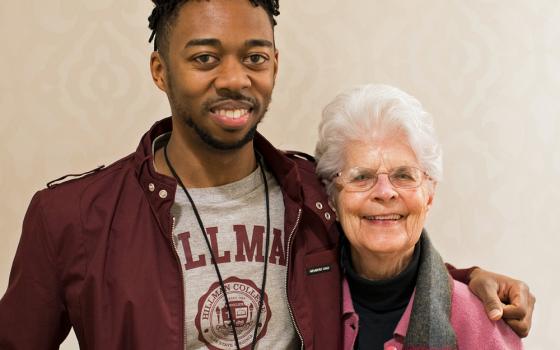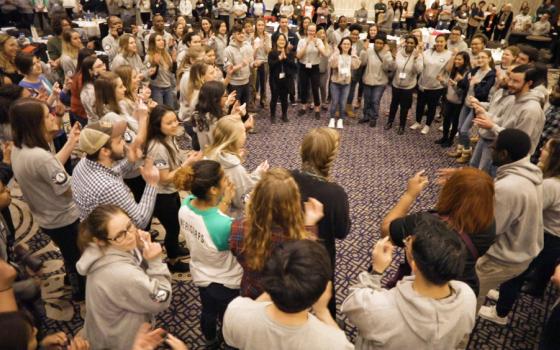Anthony Newman can attest to the change Notre Dame Mission Volunteers-AmeriCorps can make in the lives of young people.
He was a massage therapist in Virginia in 2011 seeking to help people in a bigger way when he heard about the program from a friend. He joined the program for two years as a GED test (high school equivalency program) instructor at the Julie Community Center in Baltimore, then stayed in the same neighborhood for another four years as a youth coordinator for another nonprofit. He is now a racial equity consultant in Baltimore.
"I didn't have experience, and they took a chance on me. I learned about how many skills and strengths I didn't know I had because there was an opportunity to be creative, to try stuff, to mess up," said Newman, who in 2015 was invited to join the Notre Dame Mission Volunteers board and is now in his second term. "I can't think of another place where I would be able to grow and bring my unique self to something I was so passionate about."
He calls Sr. Barbara ("Bobby") English, then the site director for Notre Dame Mission Volunteers-AmeriCorps in Baltimore, his "superhero," saying he feels "honored" to have been able to work with and be mentored by one of the sisters regularly.
Notre Dame Mission Volunteers-AmeriCorps is a partnership between Notre Dame Mission Volunteers, a program of the Sisters of Notre Dame de Namur, and AmeriCorps, a network of U.S. service programs. In Notre Dame-AmeriCorps, members, most of whom are in their 20s, spend 11 months serving in a variety of individual and small-group teaching, tutoring and other programs. In exchange, they receive a stipend for living allowances, help with student loans through AmeriCorps, a wealth of new skills and, often, a lifetime appreciation for service.
"There's a transformative nature of the work," said Sr. Judi Clemens, president of the Notre Dame Mission Volunteers board. "It's not just cranking out services. The people who engage in this work are personally transformed. Their lives are changed forever."
Notre Dame-AmeriCorps now has more than 400 members in about 200 locations in 25 cities around the United States, up from 46 members in four cities when it first partnered with AmeriCorps in 1995 and the half-dozen volunteers when Notre Dame Mission Volunteers started in 1992.
Partnering with AmeriCorps allowed Notre Dame Mission Volunteers to substantially grow its volunteer program, said Sr. Katherine ("Sissy") Corr, who became executive director of Notre Dame Mission Volunteers in 1994 and was the driving force in growing the program by linking up with AmeriCorps.
"You have to think fundamentally: What is your goal?" Corr said. "It is to expand our work with the poor, to have people be in touch with their God-given dignity and potential."
While AmeriCorps partners with other faith-based organizations, their partnership with the Sisters of Notre Dame de Namur is the only one directly with a Catholic women religious congregation. It is also one of its longest-running, said Samantha Jo Warfield, spokesperson for the Corporation for National and Community Service, the independent federal agency for volunteering and service that oversees AmeriCorps.
"It shows innovative thinking on the part of the sisters," she said. "They're in the communities. They see the need year in and year out and see the potential that AmeriCorps can give. It helps them build capacity for what they are doing and gives them an influx of new energy, of people wanting to change the community, change the country, change the world under the direction of these wise women."
Inspiration for a lifetime of service
Sisters are vitally involved in Notre Dame Mission Volunteers-AmeriCorps. Two Sisters of Notre Dame de Namur serve as site directors, and dozens of sisters provide support to the program, the congregation's only national ministry. They serve as mentors for members and staff and on the board of directors, hold leadership roles at service locations, and some have even participated as volunteers themselves.
Their influence in the program was evident during the program's mid-year training conference in February. The weekend brought together about 300 Notre Dame-AmeriCorps members for workshops, presentations by site area teams and inspirational speakers, including Sr. Helen Prejean, internationally known for her advocacy against the death penalty.
Among the attendees were more than two dozen Notre Dame de Namur sisters, who connected with current and former volunteers and site directors they had mentored. Some also served as presenters on workshops topics such as education and the art of critical thinking, the challenge of implicit bias, the impact of addictions, even a session on tai chi.
The sisters "have taught us that a lifetime of service is a series of commitments to those who are most in need," Adrienne Andrews, executive director of Notre Dame Mission Volunteers, said in her conference address. "The sisters' belief that education is the central tool in the struggle for dignity is the foundation" of the program.
That focus on education drew Andrews to Notre Dame Mission Volunteers-AmeriCorps, first as a volunteer, then as a staff member since 2006. She was named executive director in 2016 as Corr developed the Haiti program.
Andrews said she herself is an example of someone whose life was changed because of a year of service.
After graduating from Case Western Reserve University in 2004, Andrews was looking for a service opportunity that was loosely faith-based. She had grown up in working-class Youngstown, Ohio, and remembers being struck in high school by the disparities in educational opportunities in the area.
"Peers in the county next to us had resources we didn't have access to, and that drilled in the importance of education," she said.
She found the Notre Dame-AmeriCorps program online in the fall of 2004, interviewed for the program and a week later moved to Watsonville, California, where she served through July 2005 tutoring high school students.
Wanting to extend her connection with the program, Andrews was hired at the Notre Dame Mission Volunteers-AmeriCorps office in Baltimore and spent 11 years doing every job in the office: program management, data collection, and the complicated financial and administrative tasks needed to oversee the AmeriCorps grant. She also learned about accounting, budgeting and maintaining relationships," business skills to complement my passion for service and education," she said.
That passion hasn't waned.
"Every child should have access to an education that helps them reach their God-given potential," she said. "The quality of service opportunities and the number of people who shared this common mission continue to inspire me."
She said she sees additional potential in growing the number of volunteers and other religious congregation and organization partners. Most members sign up directly through Notre Dame-AmeriCorps, but members also come from more than a half-dozen other religious congregations and Catholic organizations. Notre Dame Mission Volunteers partners with these organizations to administer the AmeriCorps grant portion of their programs, which allows their volunteers to receive AmeriCorps benefits.
Andrews said her hope is that more congregations and organizations will see the model "as a way to continue and grow their ministries," she said.
Roughly half of the program members intend to go into education, she said, but the program benefits volunteers regardless of their career paths.
"What we do in their year or two of service is give them tools around communication, classroom management, training, and how do they dig deeper into what their faith is," Andrews said. "They may name it in some other way — their spirituality or whatever it is — but we all come together around these values of enhancing the dignity of each person, and I think that's something that can sustain you over a lifetime."
The desire generated in many members to continue lives of service is a clear benefit of Notre Dame Mission Volunteers-AmeriCorps, said Sr. Ann Kendrick, director of the Hope CommUnity Center in Apopka, Florida, which she and two other sisters started in 1971 to help migrant farmworkers. The center, which offers after-school programs, tutoring, college access and community organizing efforts, has had as many as 33 Notre Dame Mission Volunteers-AmeriCorps members at one time and currently has about 20, she said.
"One of the best-kept secrets is the economic impact in the local community," she said.
The trained volunteers from Hope CommUnity Center often stay in the area when their years of service are over. Nine former Notre Dame Mission Volunteers-AmeriCorps members have gone on to become program directors at the center, Kendrick said, and she sees many former members now at positions at other nonprofits in the central Florida region.
The training, support and guidance from the sisters are invaluable, several members and site directors said, and frequently evolve into a lasting bond.
When Jessica Kanoff became regional site director of Notre Dame Mission Volunteers-AmeriCorps of Connecticut, New York City and Tampa in 2014 after two terms of service, former site director Sr. Ann Howard was one of the first people to greet her.
"She found my office, and we had Tuesday lunches to make sure everything was all right," Kanoff said. Even after Howard moved to Washington, D.C., a few years later, their discussions continued.
"At least every other month, I get a call on Tuesday, and she says, 'This is our time,' " Kanoff said.
'A much richer scenario'
Corr realized the potential to extend the reach of Notre Dame Mission Volunteers that could come with a partnership after she heard a representative of AmeriCorps, then a new government program, speak at a Catholic Volunteer Network conference in 1994. She sought the support of other sisters and applied for a grant, which was received in August 1995. With the $650,000, the program was able to install volunteers in Baltimore, Cincinnati, Boston and Apopka a month later.
AmeriCorps provided more than money, offering training for members and resources.
"They were right there on the ground to build a network to provide quality services," Corr said.
The prospect of working with a government program didn't intimidate her.
"People were afraid to cross that bridge of the separation of church and state," she said, but she figured that could be managed. Retreats are offered to Notre Dame Mission Volunteers-AmeriCorps members, for example, but AmeriCorps money is not used, and members are not required to attend, she said.
As the program matures and sisters age, more laypeople are serving as site directors and giving workshops at the mid-year training weekend — and that has benefits, Corr said. The sisters say they learn from the volunteers, receiving an infusion of energy, enthusiasm and ideas.
"We now have a much richer scenario," Corr said.
Corr now oversees the Notre Dame Mission Volunteers' international program, which is separate from the AmeriCorps partnership. In 2012, the organization started before- and after-school programs for children in Les Cayes, Haiti, about five hours south of Port-au-Prince, and in 2018 added a bakery to its projects that provides jobs for local workers and scholarships to the education program for their children.
At 77, Corr travels to Haiti for six weeks at a time, focusing on these new projects. Growing the Notre Dame Mission Volunteers program "has been a great joy in my life — a great privilege."
The volunteer program has enabled the sisters "to keep expanding our work with the poor and 'have our hearts as wide as the world,' " she said, citing the Sisters of Notre Dame de Namur motto.
It is a gift, she said, "to be in dialogue with young people and those they are serving."
[Gail DeGeorge is editor of Global Sisters Report. Her email address is gdegeorge@ncronline.org. Follow her on Twitter: @GailDeGeorge.]






